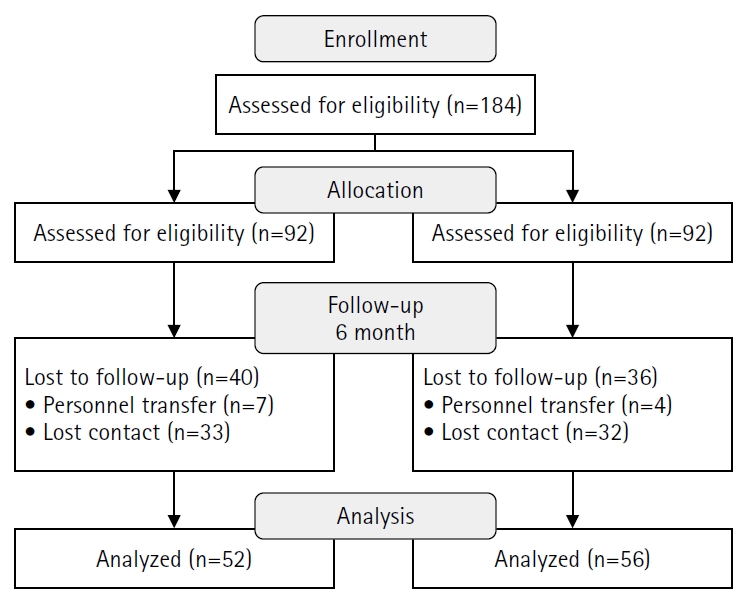Search
- Page Path
- HOME > Search
- Development and evaluation of the Trauma-nursing Education and Skill Support program to enhance trauma nursing competencies: a quasi-experimental study
- Tae Yeong Yang, Myung Jin Jang, Ki Ung Kim, Min So, Mi Na Choi, Eun Jung Lee, Jin Su Jo, Ji Yun Lee, Kwang Kyun Lim, Kyoung Mi Kim, Hae Jun Baek, Sun Ho Wang, Jin Oh Choi
- J Korean Acad Nurs 2026;56(1):67-80. Published online February 24, 2026
- DOI: https://doi.org/10.4040/jkan.25134

-
 Abstract
Abstract
 PDF
PDF ePub
ePub - Purpose
This study aimed to develop and evaluate the effectiveness of the Trauma-nursing Education and Skill Support (TESS) program based on the ADDIE model (Analysis, Design, Development, Implementation, Evaluation model). The program was designed to enhance trauma nurses’ clinical competencies, including trauma-related knowledge, self-efficacy, and problem-solving ability, through the integration of theoretical education and simulation-based practice.
Methods
A quasi-experimental study using a non-equivalent control group pretest–posttest design was conducted. Participants included 108 trauma nurses from regional trauma centers, military trauma centers, and emergency care facilities, who were assigned to an experimental group (n=52) or a control group (n=56). The TESS program consisted of a 2-day, 14-hour blended-learning course that included eight lecture sessions and four simulation-based practice stations. Data were collected at baseline, immediately after the intervention, and at 6 months using validated instruments measuring trauma-related knowledge, self-efficacy, and problem-solving ability. Two-way repeated-measures analysis of variance was used for data analysis.
Results
The experimental group demonstrated significant improvements in trauma-related knowledge, self-efficacy, and problem-solving ability compared with baseline (all p<.001). These improvements were sustained at 6 months, although trauma-related knowledge scores showed a slight decline compared with immediate posttest levels. Between-group analyses confirmed significant group-by-time interaction effects for all outcomes: trauma-related knowledge (η2=0.12, p<.001), self-efficacy (η2=0.09, p=.002), and problem-solving ability (η2=0.08, p=.003).
Conclusion
The TESS program effectively enhanced trauma nurses’ trauma-related knowledge, self-efficacy, and problem-solving ability, with effects sustained for up to 6 months. Incorporating blended learning and simulation-based training into standardized trauma nursing education may strengthen clinical competencies and ultimately contribute to improved patient outcomes.
- 166 View
- 14 Download

- Adaptation Experiences in South Korea of Men defecting from North Korea
- Kyoung Mi Kim, Miyoung Kim
- J Korean Acad Nurs 2013;43(3):431-441. Published online June 28, 2013
- DOI: https://doi.org/10.4040/jkan.2013.43.3.431
-
 Abstract
Abstract
 PDF
PDF Purpose The study was done to explore meanings and essence of the experience in South Korea of men defectors from North Korea.
Methods Data were collected from March, 2011 to May, 2012, through in-depth interviews with ten men defectors. Data analysis was conducted using the process of hermeneutic phenomenological reflection.
Results Eight essential themes were extracted; 'buoyant expectation for a new life', 'feeling guilty about family left behind in North Korea', 'inability to become acclimatized due to communication difficulties', 'inability to socialize with South Koreans due to different lifestyles', 'finding strength through trustworthy acquaintances', 'continuing reconciliation with oneself while trying to assimilate into South Korean culture', 'self-realization of one's original self', and 'continuing to feel out the possibility of a future in South Korea'.
Conclusion The findings indicate that North Korean men who defect to South Korea shape their identity through three phases: forming self-image during escape from North Korea, trying to become accustomed to South Korean society, and finding their own identity by self-realization of their original self. Eventually, the whole process enables them to recover their identity, to feel a sense of belonging, and to discover possibilities for a better future.
-
Citations
Citations to this article as recorded by- Health‐seeking experience of North Korean women defectors in South Korea
Chong‐Hee Chung, Hee‐Young Kang, Pamela K. Lake
Public Health Nursing.2018; 35(3): 192. CrossRef
- Health‐seeking experience of North Korean women defectors in South Korea
- 1,183 View
- 18 Download
- 1 Crossref

 KSNS
KSNS
 E-SUBMISSION
E-SUBMISSION

 First
First Prev
Prev


